Sustainability / Social Report / Customer Satisfaction and Safety Assurance Process Safety and Disaster Prevention
Basic Approach
The Daicel Group regards safety as one of its most important foundations. Adhering to the Daicel Group Basic Policies for Responsible Care, it identifies risks associated with processes related to safety and disaster prevention through various assessments.
The Group then takes preventive actions that include eliminating and mitigating those risks. Moreover, in the event of a safety incident during any process, necessary measures are taken, based on the BCP Guidelines, to minimize damage.
Promotion System
Initiatives on Process Safety and Disaster Prevention
To achieve its goal of zero accidents involving fires, explosions, and leaks, the Daicel Group engages in voluntary initiatives to ensure process safety by conducting risk assessments to identify and address hazards. The causes of problems that occur at Daicel Group sites, and the appropriateness of countermeasures to address them, are discussed at regular meetings of supervisors of environmental and safety divisions, and efforts are made to prevent similar incidents.
Status of Accidents in FY2024/3 (business sites of Daicel and domestic Group companies)
- Small fires: four cases (down two from FY2023/3)
- Leakages: five cases (unchanged from FY2023/3)
- Property damage: zero cases (unchanged from FY2023/3)
All of the above incidents were contained at the business sites and did not affect operations. The causes of these incidents have been investigated, and preventive measures were implemented to address both physical and human errors. Along with using the Occupational Accidents and Process Safety Incidents Database to keep all business sites appraised of the details and causes of incidents and measures to prevent their recurrence, we investigate whether similar incidents have occurred and have taken measures to prevent potential incidents from occurring.
Risk Assessment
The Daicel Group seeks to ensure safety as a foundational principle of its operations by identifying, assessing, analyzing, and addressing process safety risks with regard to hazards that include explosions, fires, and the leakage of hazardous or toxic materials through equipment safety assessments as part of its Total Environmental, Health, and Safety Assessment System.
【Initiatives for FY2024/3】
Regarding self-reactive substances involving the risk of runaway reactions associated with thermal decomposition and polymerization, as a continuation of efforts in FY2023/3, a Working Group comprising production divisions, equipment management divisions, safety environment divisions, and internal experts conducted analyses that included simulations based on the latest data and information. In addition, we systematically introduced remote monitoring cameras to reinforce the monitoring of plants deemed to be at risk, and installed remote fire prevention and extinguisher systems to minimize any possible risks and damages in the event of an accident.
Equipment Safety
To keep its production equipment in good condition, the Daicel Group works to prevent equipment malfunctions and ensures safe and stable plant operations by following established maintenance cycles for all operating equipment that requires maintenance and performing this maintenance at all business sites without delay. We also have a working team comprising members of production, equipment management, development, and other divisions that conducts routine inspections to identify equipment problems and abnormalities, which we refer to as “TH.” We then use these findings to examine causes of incidents and countermeasures in order to make improvements and also use these to review our maintenance standards.
Maintenance Dojo
Ensuring the good condition of production equipment requires maintaining and improving upon the technical capabilities of our equipment management divisions. The Daicel Group has taken a variety of countermeasures to strengthen the maintenance of its chemical plants. However, with the passing of the torch from one generation to the next in and around 2007, accidents began to occur that appear to have been caused by declining capabilities regarding maintenance, construction management and supervision, acceptance inspections, and problem analysis. In response, we opened the Maintenance Dojo and began offering a more practical curriculum with the goal of passing on maintenance skills and techniques while improving work quality. Dojos were opened for mechanical work in FY2016/3 and for electrical and instrumentation work in FY2018/3.
Initiatives of the Maintenance Dojo
To assure safety and quality in chemical plants, properly maintaining and managing equipment on a daily basis is essential. It is therefore also vital to accurately identify and evaluate the condition of equipment and take the proper measures at a stage when defects are small, and it is people who take these important actions.
The Daicel Group believed that traditional knowledge and experience-based human resource development was inadequate for developing the human resources that would support safety and quality, so it opened the Maintenance Dojo as a place for practical training in specialized techniques and skills. Through the dojo, we nurture our human resources into people who can take ownership of the maintenance and management of Daicel equipment and perform these tasks with confidence and pride.
Equipment diagnostic engineering core members serve as supervisors (instructors) at the Maintenance Dojo, where maintenance technology required for the Daicel Group is organized into the following categories.
- 1Specialized maintenance education for maintenance engineers
- 2Voluntary maintenance education for operators
- 3Technical training for the staff of partner companies
The curriculum for mechanical work consists of the following six core technologies: corrosion and deterioration damage analysis, welding management, nondestructive inspections, sealing technologies, lubrication management, and vibration diagnostics. The curriculum for electrical and instrumentation work consists of the following four core areas: practical training on construction and production, acceptance inspections and checks, cause investigations, and operational training on disassembly and maintenance, cause investigation. Through these curricula, we offer practical training that is not limited to imparting knowledge through classroom lectures. In addition, technical skills acquired at the Maintenance Dojo are put to practical use through OJT involving periodic repair and construction work (SDM construction), thereby establishing and improving trainees' skills.
The targets for this training are not only Daicel Group employees but also staff of partner companies engaged in maintenance work.


Case Study Training for Tightening Pipe Flanges
Since 2009, using a system developed in-house, our Aboshi Plant has provided training to improve our employees' pipe flange tightening skills. The system visualizes trainee skills by displaying in real time on a computer screen the axial force of a bolt and the surface force of a tightened gasket at the time of flange tightening (Photo 1). Due in part to the introduction of a skill certification system, these efforts have had a remarkable impact on preventing leakage from pipe flanges. The training was incorporated into the Maintenance Dojo in 2015 and has since been fully rolled out at each plant of the Group and our partner companies (Photo 2).
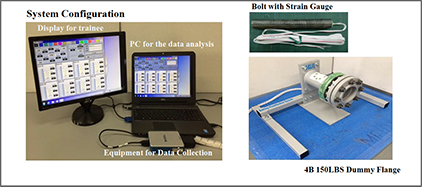
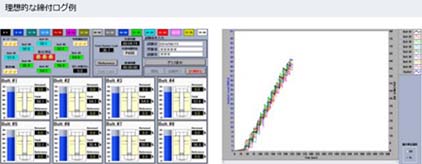
(Photo 1) Flanged bolting simulator (D-BOLVIS: Daicel Bolting Visualization)
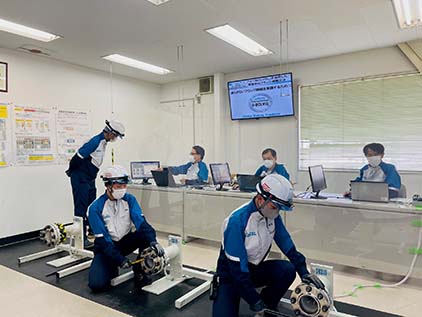
Case Study Training Programs for Electrical and Instrumentation, System Construction, Production and Acceptance Inspections, and Checks
- Instructions on using tools and measuring instruments for electrical and instrumentation work, as well as basic operations and training
- Practical training for cable terminal processing, tubing, and crimping terminal processing
- Practical training for checking software and replacing the converter card
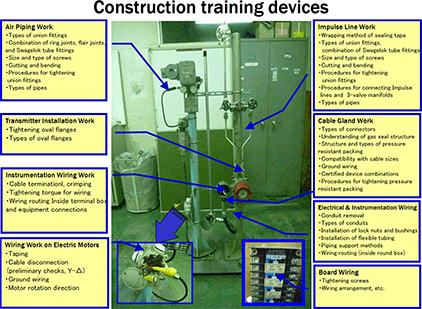
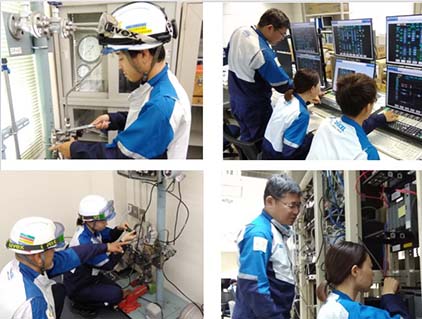
Emergency Responses
In the event of a major disaster such as a huge fire, explosion, or natural disaster, including an earthquake and tsunami, the Groupwide Disaster Response Headquarters will respond in accordance with its Disaster Response Rules.
These headquarters have been established at the Innovation Park and the Osaka and Tokyo head offices, with overall operations managed by the President and CEO serving as the General Manager and the Director in charge of Responsible Care serving as the Deputy General Manager.
Along with installing antennas for satellite cell phone communications, we also deployed an information sharing system that can be accessed from all business sites as well as off-site in FY2022/3 as part of measures to strengthen the information infrastructure between business sites during a widespread disaster. We also introduced systems for Safety Confirmation and Emergency Call Systems at all Group business sites in Japan. In emergencies, personnel can quickly confirm the safety of other employees and family members and get information about the situation using the Safety Confirmation System. The Emergency Call System is used to stay informed about disaster situations and convene response headquarters personnel, and its early deployment at the Groupwide Disaster Response Headquarters and business sites' response headquarters has helped strengthen our emergency response capabilities. In addition, the Groupwide Disaster Response Headquarters promptly disseminates information about damage to people or property, as well as the impact on local communities, through the Daicel Group's website.
As part of our commitment to staying in close communication at all times with local communities, every one of our business sites has established procedures for disseminating information to local residents and other people outside the company. We are also actively reporting on subjects such as the Group's environmental conservation and safety promotion efforts through participation in things like community association meetings organized by the Japan Chemical Industry Association and community dialogue sessions,* in which relevant government bodies and company representatives participate.
*This initiative aims to further strengthen trust-based relationships through dialogue about the questions, concerns, and expectations that local communities have about certain companies and through responsible care activities that better satisfy the expectations of these local communities.
Our Organization for Emergency Responses
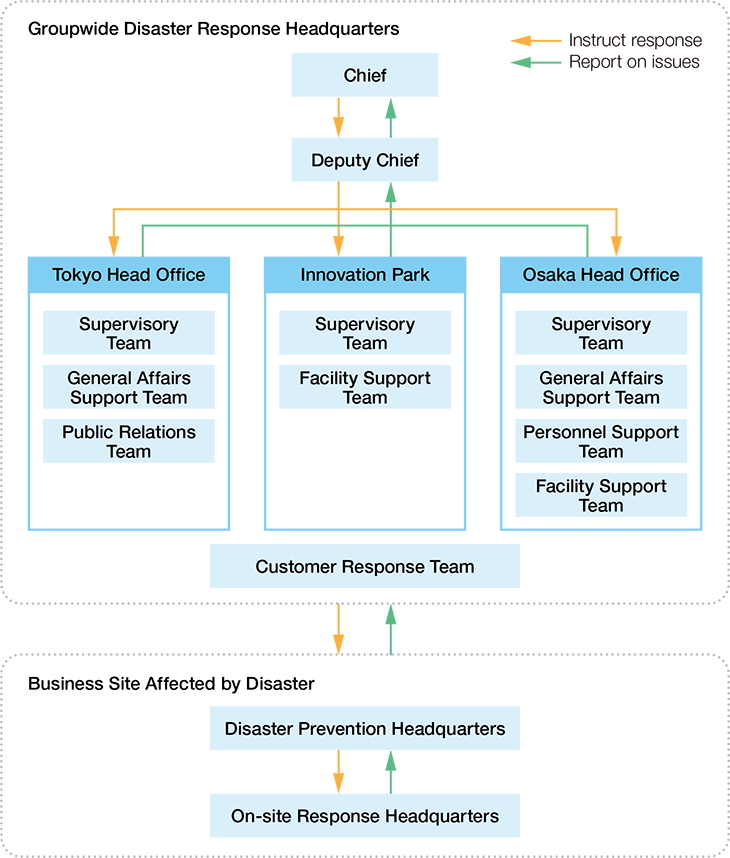
Earthquake, Tsunami, and Liquefaction Countermeasures
Taking a systematic approach, the Daicel Group has been pushing ahead with assessments of risks associated with earthquakes, tsunamis, and liquefaction as well as analyses of seismic conditions at its facilities and their structural reinforcement. In FY2016/3, we completed structural reinforcement work in line with the Act for Promotion of Renovation for Earthquake-Resistant Structures. Currently, efforts are underway to equip the facilities with greater earthquake resilience in accordance with Daicel’s in-house standards.
Disaster Prevention Drills
The Daicel Group regularly conducts emergency safety drills for all business site personnel and Group company employees at each business site. The drills are designed to prepare employees through repeated practice so that, in the event of an emergency, they are well versed in lifesaving and first-aid procedures, capable of preventing spillover effects from a disaster, and are able to efficiently collaborate with other members of communities around our business sites.
Complementing these efforts, Daicel conducts Group-wide disaster countermeasure exercises each year for Groupwide Disaster Response Headquarters personnel that address the possibility of a widespread disaster. We conduct initial response drills and BCP training without providing participants with any advance information on the disaster location or scenario, with the situation developing and changing as soon as training begins.
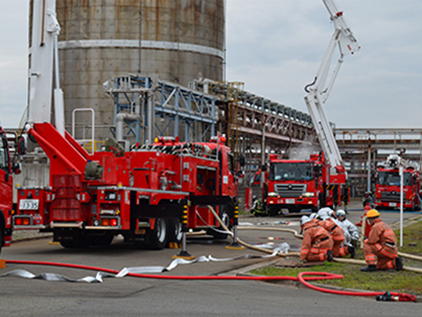
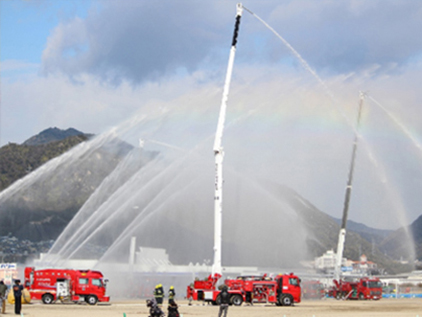
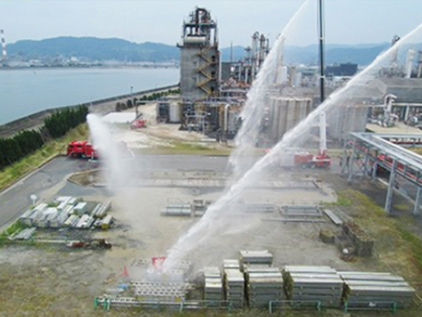
Aboshi Plant: Joint emergency drill with the local fire department and neighboring companies (conducted in FY2020/3)
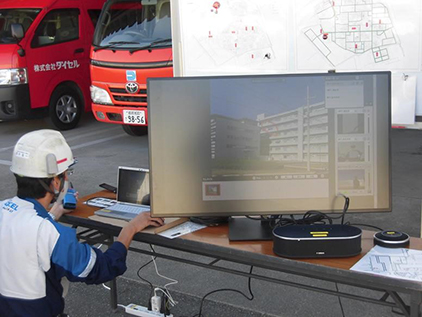


Ohtake Plant: Joint emergency drill with the local fire department (conducted in FY2023/3)



Aboshi Plant: Joint emergency drill with the local fire department (conducted in FY2023/3)
 FY2024/3 Commendation for outstanding hazardous materials engineers
FY2024/3 Commendation for outstanding hazardous materials engineers

A hazardous materials engineer at Daicel’s Ohtake Plant has received an award for outstanding hazardous materials engineers. This award is presented to those who have long committed themselves to, and have achieved noteworthy successes, in the handling of hazardous materials.